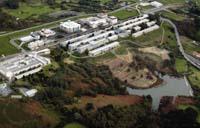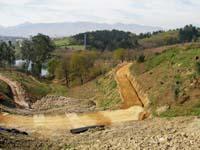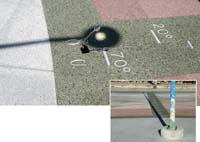Multipurpose arboretum in Leioa

An arboretum is a botanical garden with trees and other wood plants mainly. On the Leioa campus of the UPV/EHU they had long been planning to build a garden of these characteristics. At first, in the late 1980s, they wanted to have a botanical garden, but because of economic problems they could not go ahead. Now, almost twenty years later, a botanical garden will be replaced by an arboretum on the southeast slope of the campus, behind the Faculty of Fine Arts, the Faculty of Science and Technology and the Faculty of Medicine and Dentistry, with an approximate extension of 13 hectares.
The aim of the arboretum is to respond to the teaching and research needs of the UPV/EHU and enjoy any visit that approaches the site. Therefore, when they began to think about the characteristics that it had to have, they clearly saw that it had to have the shape of a park and that it had to have other elements besides the trees, such as an amphitheater and a helioscilámetro. The heliometer is a tool used to follow the movement of the Sun. On the Leioa campus there was such a tool since 1989, but it was expelled in the campus reform works.
They organized a contest of ideas to decide what would be the definitive structure of the Arboretum and how to integrate those essential elements. They received the proposals of six working groups, the first being awarded by the company Land Art Studio in Valladolid.
Different trees in different areas
As the name suggests, trees will be the main protagonists of the arboretum. It will bring together a total of 175 tree and shrub species, both native and foreign, organized in different areas.

Exotic species will be located in two areas: a collection of trees and shrubs from the far east and another collection of trees from the southern hemisphere. The native trees will be organized imitating six forests of the Autonomous Community of the Basque Country: a birch, a beech, a oak, a holm oak, a riverside forest and a grassland. They will imitate the potential vegetation of each type of forest, that is, they will place in each forest species that should be in a natural state. Forests will not be located anywhere, respecting and ordering their distribution in nature according to their altitude. The area where the Arboretum will be located is very abrupt so you will have no problems.
In addition, a special space will be created for the production trees used by man. There, on the one hand, there will be trees that we exploit for wood; on the other, trees that give food; and finally, medicinal trees. In addition, the singular trees mentioned above will be placed on a circuit.
Not only trees
Due to the need for more than one collection of trees and shrubs, they will use other existing resources around the future arboretum area to enrich themselves. For example, they will make a gap to art. The above mentioned amphitheater will have an approximate capacity of 400 people. On the other hand, taking advantage that the Faculty of Fine Arts is very close, an artistic circuit will be held in the closest part of the Faculty so that students have a place to exhibit their works. A covered pavilion will also be built to show the works to be kept under cover.

The Faculty of Medicine will also provide the sculpture “The Forest of Life” in a small space that will be the arboretum in 2003. They built their body in honor of those who give their body to science, where they keep the ashes of the bodies that medical students use to learn anatomy. As this sculpture will be highlighted in the park.
The multi-objective arboretum, elements and spaces is more than a project that has already begun to come true. The work began at the beginning of the year and is expected to end by the end of the year. Only one thing will be missing: letting time pass until the trees rise and reach their highest level.
Buletina
Bidali zure helbide elektronikoa eta jaso asteroko buletina zure sarrera-ontzian










